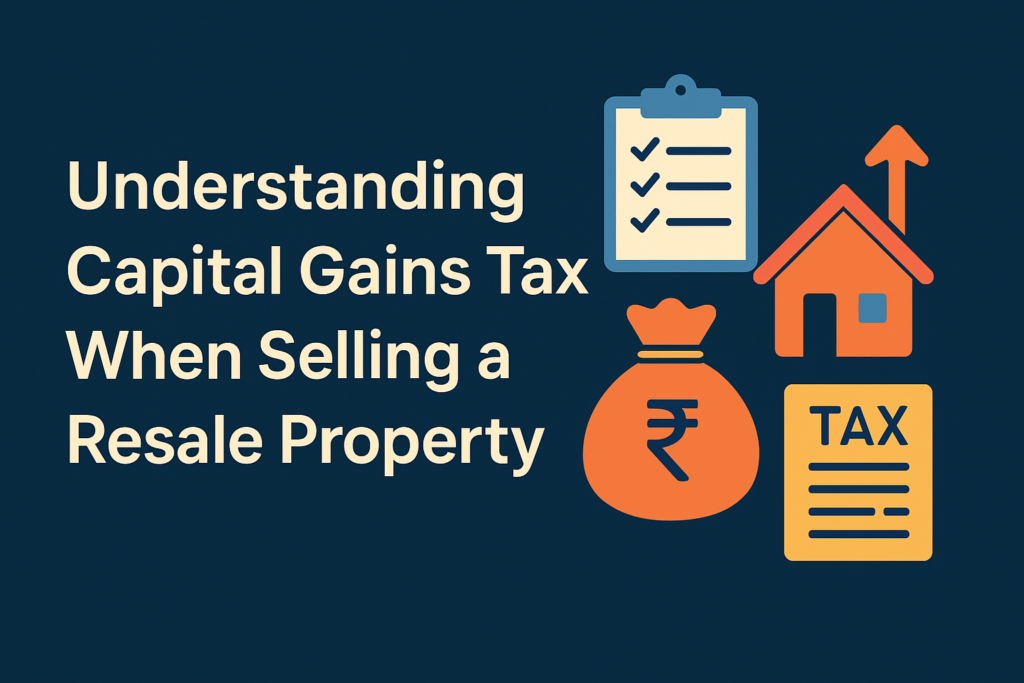
When you decide to sell a resale property, you’re probably thinking about the profit you’ll make. But before you celebrate, there’s something important you need to consider — capital gains tax. This tax can reduce the amount you actually take home from the sale, so it’s important to understand how it works.
Don’t worry! In this blog, we’ll explain capital gains tax in the simplest way possible. Whether you’re selling a house, flat, or any real estate that’s not brand-new, this guide will help you make smarter choices and avoid unexpected tax surprises.
What Exactly Is Capital Gains Tax?
To put it simply, it is a tax you pay on the profit you earn from selling something valuable — like a property. If you sell a resale property for more than what you paid for it, the extra money (called capital gain) may be taxed.
Here’s a simple example:
- You bought a property for ₹40 lakhs.
- A few years later, you sold it for ₹70 lakhs.
- Your gain is ₹30 lakhs.
- This ₹30 lakhs may be taxed as a capital gain.
There are two types of capital gains, depending on how long you owned the property.
Types of Capital Gains Tax on Resale Property
Understanding the type of gain is important because the tax rate depends on it.
1. Short-Term Capital Gains (STCG)
If you sell the property within 2 years of buying it, it’s considered a short-term gain. The profit will be added to your regular income and taxed as per your income tax slab.
2. Long-Term Capital Gains (LTCG)
If you sell the property after 2 years, it becomes a long-term gain. In this case, the profit is taxed at 20%, but you can get tax relief by using something called indexation (which adjusts for inflation).
How to Calculate Capital Gains Tax Step-by-Step
Knowing how to calculate capital gains tax on a resale property can help you plan better. Here’s a step-by-step guide:
Step 1: Know Your Selling Price
This is the amount you receive when you sell your property.
Step 2: Subtract These Costs:
- Purchase cost, adjusted for inflation
- Cost of improvements, like major renovations
- Expenses for selling, such as agent commission or legal fees
The amount left after subtracting these costs from the selling price is your capital gain. This is the part that may be taxed.
Legal Ways to Save Capital Tax in India
Now, here’s the good news: there are legal ways to reduce or avoid paying capital gains tax when selling a resale property. Here are a few options:
1. Reinvest in Another Residential Property (Section 54)
If you use the profit to buy a new home within 2 years (or construct one in 3 years), you can avoid paying tax on the capital gains.
2. Invest in Capital Gain Bonds (Section 54EC)
Within 6 months of selling your property, you can invest up to ₹50 lakhs in bonds issued by government-backed companies like NHAI or REC. These bonds offer tax exemption on your gains.
3. Set Off with Capital Losses
If you’ve lost money on other investments, like shares or property, you can use those losses to reduce your capital gains and pay less tax.
💡 Note: Always speak to a financial advisor or tax expert before making decisions, as rules may change or depend on your specific case.
Why You Should Understand Capital Gains Tax Before Selling
Understanding capital gains tax when selling a resale property is not just about paying less tax — it’s about being prepared. Here’s why it matters:
- You can plan your sale better to save more
- You avoid last-minute tax surprises
- You may even qualify for full exemptions
Selling property is a big step. Knowing the tax rules helps you stay in control of your money.
Final Words
Selling a resale property can be profitable, but don’t forget about capital gains tax. It’s better to understand it in advance than to deal with an unexpected bill later. With the right knowledge and smart planning, you can reduce or even eliminate the tax legally.
So, the next time you’re ready to sell, keep this guide handy. A little tax awareness can go a long way in protecting your profits.

Join The Discussion